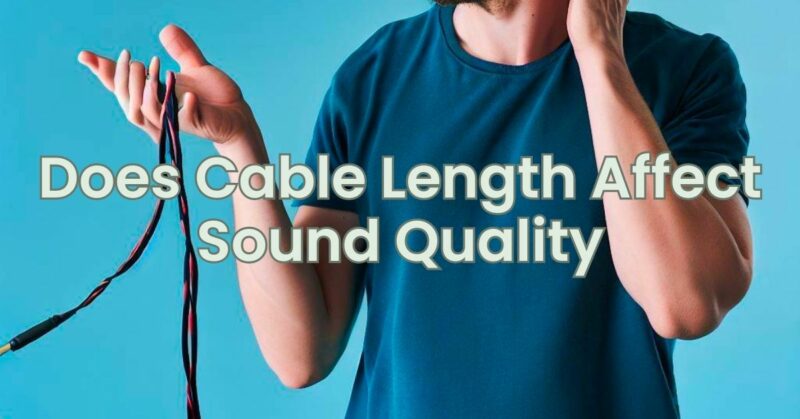When setting up audio systems, one common concern is whether the length of the cables used can impact sound quality. The question arises: does cable length really make a difference in audio reproduction? In this article, we explore the relationship between cable length and sound quality to provide a better understanding of this topic.
- Signal Loss and Degradation: One consideration with longer cables is the potential for signal loss and degradation. As the electrical signal travels along the cable, it encounters resistance, which can lead to a reduction in signal strength. This can result in a loss of high-frequency detail and overall clarity. However, the actual impact on sound quality is generally minimal within reasonable cable lengths.
- Capacitance and Inductance: Cable length can also affect the cable’s capacitance and inductance, which are inherent properties of the cable. Higher capacitance can cause a roll off of high frequencies, while higher inductance can lead to a roll-off of low frequencies. However, the effects of capacitance and inductance are more prominent in longer cable runs, such as those used in professional audio setups, rather than in typical home audio systems.
- System Sensitivity: The impact of cable length on sound quality can vary depending on the sensitivity of the audio system. Higher sensitivity systems, such as studio monitors or high-end audiophile setups, may exhibit more noticeable changes due to cable length variations. In contrast, lower sensitivity systems may not experience significant differences in sound quality.
- Interference and Noise: Longer cables have a greater chance of picking up interference and noise, especially in environments with high electromagnetic interference (EMI) or radio frequency interference (RFI). This interference can manifest as audible hums, buzzes, or static in the audio signal. However, the impact of interference is more related to cable quality and shielding than cable length alone.
- Practical Considerations: When it comes to cable length, it is important to strike a balance between functionality and sound quality. In most home audio setups, using cables of reasonable length (up to a few meters or yards) should not cause significant sound quality issues. It is advisable to avoid excessively long cables, as they can increase the risk of signal loss and interference.
- Cable Quality: While cable length can have a minimal impact on sound quality, the quality of the cable itself, including construction, shielding, and materials, plays a more significant role. Investing in high-quality cables with proper shielding and good conductor materials can help mitigate potential signal degradation and interference issues.
In conclusion, while cable length can theoretically impact sound quality by introducing signal loss, degradation, or interference, the actual audible difference in most home audio setups is typically minimal within reasonable cable lengths. It is important to prioritize cable quality, and proper system setup, and address other factors that can have a more substantial impact on sound quality, such as speaker quality, room acoustics, and system calibration. By selecting well-made cables of appropriate length and focusing on overall system optimization, you can ensure a satisfying audio experience without undue concerns about cable length affecting sound quality.


